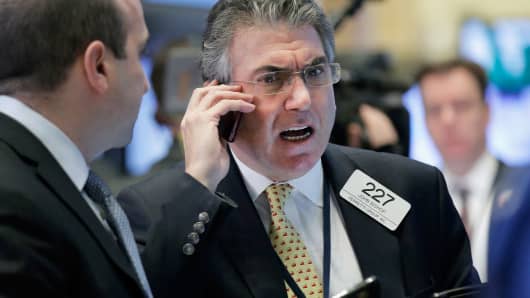The world’s stock markets are in the red for the year amid a global equity rout. But what’s behind it?
Despite well-known experts warning about the prospect of a U.S. or even global recession, there is little clear sign to that effect, raising questions as to why stocks are falling so fast.
CNBC takes a look at the leading suspects behind this year’s roller-coaster ride for markets.
Contents
Bank of Japan
The Bank of Japan’s surprise move to introduce negative interest rates at the end of last month knocked investors’ confidence in the strength of the world’s third-biggest economy and raising fears that charging banks to hold reserves with the central bank will eat into profits.
Adding fuel to the fire, Japan’s central bank itself has raised concerns that the introduction of negative rates could catalyze competition between central banks to lower rates deeper into negative territory.
“We’re now in a situation where the Fed has raised rates; they are not doing anymore quantitative easing. We’ve got the Bank of Japan, the ECB pushing us into more negative rates and I think that is what is really setting alarm bells ringing in the market,” Grant Peterkin, senior fixed income portfolio manager at Lombard Odier Investment Managers, told CNBC on Tuesday.
“In reality, is it quantitative easing that has pushed us forward or do we need any more negative rates? And I think investors are just getting a little bit worried about the outright level of yields and taking some profits. But also, the volatility that is being exacerbated by the central banks I think will continue.”
In the wake of the Bank of Japan’s move, yields on 10-year Japanese government bonds moved on Monday into negative territory.
European banks
The spotlight is back on the euro zone’s financial sector after the region’s central bank asked major Italian banks for information on their still-large portfolios of non-performing loans. Both the banks and Italian policymakers insisted that the request should not worry investors, but shares of Italian banks have slumped none the less. Since the start of the year, shares of Unicredit and Intesa Sanpaolo, Italy’s two biggest banks by market capitalization, have declined by 43 percent and 28 percent, respectively.
Read MoreUnicredit on rollercoaster ride post-earnings
Over the past week, worries about banks across Europe have ramped up, in part due to the sector’s exposure to slumping energy prices.
The co-CEO of Deutsche Bank, John Cryan, rushed on Tuesday toreassure investors and staff about the bank’s stability, but his words only provided a temporary boost to the bank’s falling stock.
“With the banking crisis of recent years still fresh in the memory, there are real fears that the banks face big challenges this year. Moreover, the euro zone recovery — what little we are actually seeing — could be threatened by any renewed weakening in the banking sector and drying up of credit,” Craig Erlam, senior market analyst at Oanda, said in a research note on Tuesday.
[“source -cncb”]


